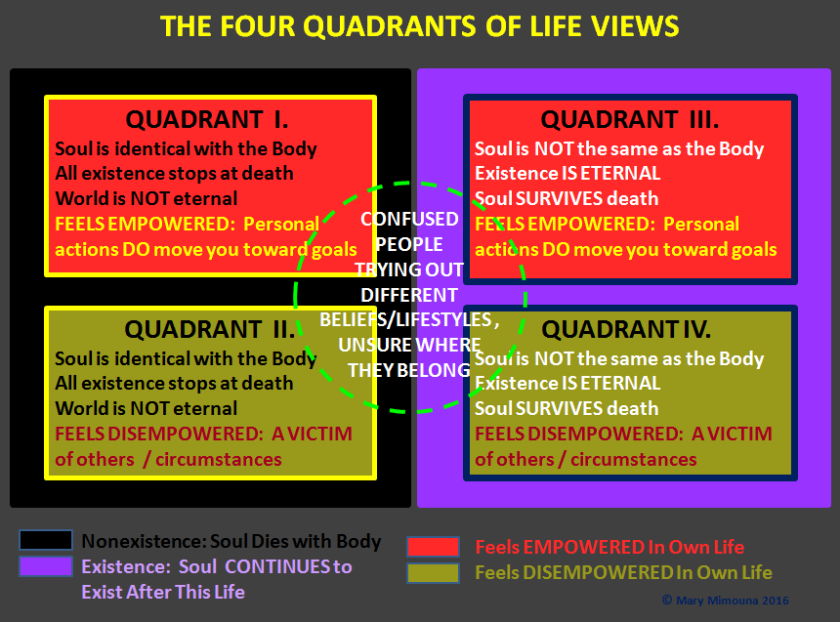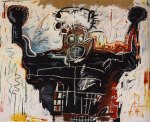
Wherever we go on the globe, people are very different in their views and lifestyles. In order to better understand people and cultures, how can we categorize people according to their varied opinions, different ways of thinking, and myriad lifestyles?
As it turns out, there are TWO BASIC CRITERIA, or “Life View” filters, into which all lifestyles and ideas can be divided: Existence vs. Nonexistence, the most important; and Empowerment vs. Disempowerment, the second most important.
The EXISTENCE paradigm believes that we have a soul, and that the soul is NOT the same thing as the body; that the soul SURVIVES death, and that our existence is ETERNAL.


The NON-EXISTENCE paradigm believes that we ARE our body, and the self is identical with the body; that there is no separate soul, nor any part of ourselves that survives death; that the world is finite, and that THIS LIFE is all we have and ever will have.
The EMPOWERMENT paradigm believes that our actions DO make a difference and that we all have many choices in our lives which we can use to improve our lives, no matter in what circumstances we find ourselves. People living in this paradigm feel their lives do have meaning. They have hope, make plans and take large or small steps toward making their goals materialize in reality. They usually believe in discipline, practice, and perseverance. They believe we create our lives through our habits, perspectives, and attitudes. Even when faced with the worst outside circumstances.


The DISEMPOWERMENT paradigm believes that personal efforts and actions have no effect whatsoever on helping one reach their goals. People living in this paradigm feel like angry, helpless, hopeless, depressed VICTIMS; not respected, without energy, and without goals or plans. Most of all, they BLAME OTHERS (circumstances, people, events, bad luck, or even God) and REFUSE to take any positive actions because THEY DON’T BELIEVE THEIR EFFORTS WILL MAKE ANY DIFFERENCE.
Some people try out one paradigm and then another; some people are raised in one paradigm and make a switch to another as adults. When they do that, sometimes relationships with family members and former friends or spouses cannot survive that transition. The WHITE DOTTED-LINE CIRCLE in the center of the diagram above indicates the people who are, as yet, uncertain where they belong, or who are still bouncing around trying out different ideas, new types of friends and lifestyles.
To see how the categorization on this diagram works, see if you can guess in which Life Paradigm Quadrant (diagram above) the following individuals are living (answers at the bottom of this post).
- EILEEN:
Eileen believes in a higher force, as an organizing principle of the universe, and that “there is an existence on the other side,” although she doesn’t follow or believe in any organized religion. Eileen does believe that there IS a reason for all the difficulties that we are experiencing in life, even if the reason is not yet clear to us. She believes strongly that our actions DO matter, both now, and eternally. Every day she tries to be kind to others (she doesn’t always succeed)–NOT in order to “shore up good points with God,” but in order to pass positive energy forward in a “pay-it-forward” sort of way. Eileen believes our lives make in difference in the values we hold ourselves to, and in our actions toward others.
2. HAMID:
Hamid lives in North Africa. He has a university degree but cannot find a job in his field, or a job that pays well. “The rich and powerful are controlling my country,” he says. “I don’t have the right last name or right family connections to get ahead in my society, because here, nepotism controls everything. I’m a victim of the system. Anyway, I’m poor because God wanted me to be poor. If he wanted me to be rich, I would be rich. It’s all ‘written before my birth in the book of life’ so that’s why I don’t work hard, or waste my time learning new skills. There is nothing I can do to improve my life. I don’t have good luck. Other people are successful because they are lucky.”
3.) SAM:
Sam is a selfish and dishonest white-collar criminal, although he is able to hide it well because he has a great deal of personal charisma. Not only does he have a high salary and corporate jet-setting lifestyle, but he often dates models in various cities that he visits. His friends and acquaintances are jealous of his lifestyle. Sam works very hard and appears successful; he is successful, but it’s not enough for him. So he embezzles funds and stashes the money in offshore bank accounts. He doesn’t trust people and thinks it’s only a matter of time until he’ll have to skip out to a country where there is no extradition treaty with his home country, so that he can continue living his rich lifestyle. Sam doesn’t believe there is anything beyond this world, and that he’s got to get everything he can out of this life. Sam feels no guilt for anyone he defrauds.
4.) LAURA:
Laura is a scientist and environmentalist who happens to be an atheist. While not believing in God, she spends her life helping others and saving the environment and animals on the planet. She volunteers her time with humanitarian groups, as well as animal groups, and donates small amounts of money regularly. Laura feels her actions really make a difference to others and she gets great personal satisfaction from that.
5.) BOB:
Bob is very poor and lives on the street. He scrounges through trash bins to find food each day. Bob doesn’t know why his life is so difficult, but he thinks there must be a reason. He believes that his actions make a difference. Each day he tries to brighten the spirits of other homeless people like himself by saying hello to people he passes daily, and sometimes stopping and talking to them to ask how they are doing. Bob enjoys being kind to animals. If he finds food in the trash, he always tries to share at least a tiny bit of it with the street animals. Bob finds daily satisfaction in his life in spite of his poor circumstances.
6.) LUCIEN:
Lucien lives in a mansion surrounded by a high wall and security apparatus. Lucien worked hard all his life, and he also saved every penny. He is very careful about spending his money. Lucien is negative and critical of everyone around him, and he trusts no one. When asked, Lucien says he is agnostic, and thinks that God probably does not exist. Lucien doesn’t believe in giving to charity because other people are lazy and did not work as hard as he did or save as much as he did, scrimping instead of wastefully spending money like others do. Lucien’s bank account is huge, but he lives a miserly, secretive life, with few friends. Most of his conversation revolves around either what faults others have, or how “others” (the government, other people) are “out to get him” or “take his money through taxation.” He feels like society and other people are all against him, and keeping him from being able to be happy.
ANSWERS:
- Eileen: Quadrant III. Paradigms: Existence/Empowered.
- Hamid: Quadrant IV. Paradigms: Existence/Disempowered.
- Sam: Quadrant I. Paradigms: Nonexistence/Empowered.
- Laura: Quadrant I. Paradigms: Nonexistence/Empowered.
- Bob: Quadrant III. Paradigms: Existence/Empowered.
- Lucien: Quadrant II. Paradigms: Nonexistence/ Disempowered.
Related Posts on this Blog:
The Polarization of Society: A Question of Paradigms
Our Dominant Paradigms Change as We Age
